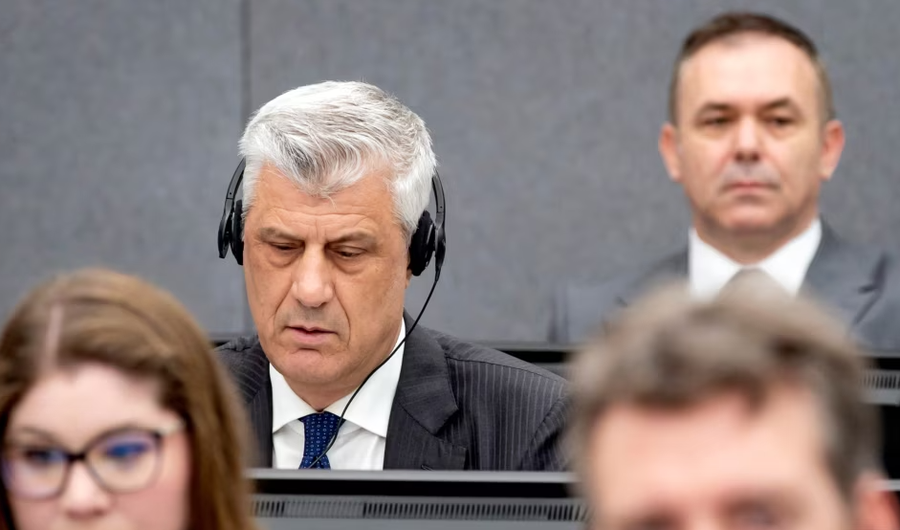
It has been a decade since the Special Court in The Hague has become a household name for the citizens of Kosovo. However, recently, in addition to court cases, it has also been mentioned for the controversy surrounding the payments that the state should make to the defense. Who is right?
On Thursdays, Radio Free Europe brings you a complete coverage of the week's hottest topic, and tells you what's worth knowing about it.
The Ministry of Justice in Kosovo said on July 24 that it has allocated a total of around 33 million euros for the defense of those accused of alleged war crimes in Kosovo, in the judicial process being conducted by the Special Court in The Hague.
More specifically, the Court investigates alleged crimes committed by members of the Kosovo Liberation Army (KLA) against ethnic minorities and political rivals from January 1998 to December 2000.
This court - with international judges and prosecutors - was established under Kosovo law in 2015, but operates in the Netherlands.
It is funded mainly by the European Union, with additional contributions from several other countries, such as the United States, Canada, Norway, Switzerland and Turkey. In the last two years it has had a budget of around 100 million euros.
Expenses for the defendants' defense teams are mainly covered by the state of Kosovo.
Despite the ministry's statements, the Kosovo Liberation Army War Veterans Organization (KLA OVL) has said that it considers the imposition of "ceiling prices" for fees to defense teams in The Hague to be shameful and has demanded their immediate removal.
The main case in The Hague is being conducted against former KLA leaders, namely former President Hashim Thaçi, former parliamentarians Kadri Veseli and Jakup Krasniqi, and former Kosovo MP Rexhep Selimi.
They are accused of war crimes and crimes against humanity, which all four have denied.
In December 2024, a second indictment for obstruction of justice was filed against Thaçi.
What "ceiling prices" are we talking about?
According to a 2024 administrative instruction, the Ministry of Justice has categorized the fees for defense attorneys with the reasoning that "the payment system should contribute to maintaining a balance between the resources and means of the accused, in this case the state of Kosovo."
According to this categorization, the state of Kosovo allocates up to 110,000 euros per month for a lawyer in the trial phase.
Acting Minister of Justice, Albulena Haxhiu, said in an interview with Radiotelevision Dukagjini on July 28 that the fourth category – the most serious – includes Thaçi, Veseli, Krasniqi and Selimi.
"What we have done is, seeing that we have had several cases of obstruction of justice, we have made the change through administrative instruction so that it is not someone with the same financial support as those facing these (war crimes) charges, because it is not the same."
According to the new administrative instruction, if someone in the Special Court is tried for criminal offenses that are not related to the crimes for which it was established, including: obstruction of justice, violation of court orders, or other violations, then the state provides up to 5,000 euros per month for defense.
"This is done to discourage anyone from harming this process. I, personally, believe that the recent cases harm them more than they help them," Haxhiu declared.
Should there be categorizations?
Amer Alija, a legal researcher at the Humanitarian Law Center in Kosovo, told Radio Free Europe that there should be limits on the amount the state allocates for protection.
"State resources cannot be spent without limit," he said briefly.
Ehat Miftaraj, executive director of the Kosovo Law Institute, said that the state of Kosovo should not be blamed for the amount of payments it makes in cases related to obstruction of justice, but that it should ensure effective protection and not spare resources when it comes to war crimes cases.
"The government should have a much clearer vision and see the defense of the defendants as defense for the state of Kosovo itself. The state should analyze, make an assessment of what the Republic of Kosovo gains and how much interest the Republic of Kosovo has in defending the KLA war and defending the four main defendants in The Hague."
According to him, the trial is now in a "critical period" due to the calling of high-profile witnesses in The Hague and the heavy commitment of the defense, therefore there may be greater expenses.
In August of last year, the Foundation "Support for the Legal Defense of Hashim Thaçi" sent a letter to the heads of state, requesting an increase in funds for the legal defense needs of the former KLA leaders, because otherwise the main lawyers were at risk of being dismissed.
But, according to Miftaraj, "the lawyers clearly knew how much the fees would be and how long the process would take."
"The problem is the fact that the defendants in The Hague, in addition to state aid, had the Foundation that supported them financially, and the defendants probably expected greater support from citizens, and when this was not enough, they fell behind with lawyer fees."
Radio Free Europe/Radio Liberty has not been able to obtain a response from the defense on whether the allegations of possible dismissals are true. The Ministry of Justice has also not responded to RFE/RL's request for more details about the payments.
The Special Court was established abroad, following pressure from the international community, to guarantee an impartial trial. Fear of possible witness intimidation is another reason why the court is based in the Netherlands and not in Kosovo.
Deputies of the Kosovo Assembly attempted to dissolve it in 2017, but without success./ REL (A2 Televizion)











